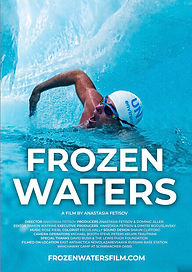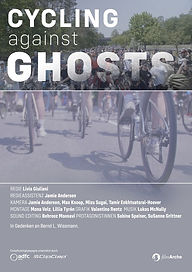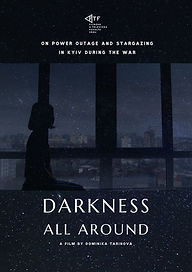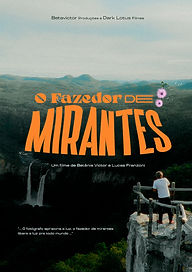
INTERNATIONAL DOCUMENTARY

Australia - 17'
SYNOPSIS
Could Australia’s past help secure its future? 65,000 years in the making, Burnt Country is about fighting fire, with fire.
Exploring the profound knowledge and wisdom of First Nations, this film is an invitation to connect country and community.
CREDITS
Director and Producer: Kirsten Slemint
Student Project - National Film and Television School
Editor: Piotr Zuchniewicz
Composer: Umberto Gaudino
Sound Designer: Em Edwards
Colourist. Karolina Matela
Key Cast: James Shaw
Cinematographer: Kirsten Slemint
ABOUT
A scientist, journalist and filmmaker, Kirsten Slemint has a keen and curious eye for story.
She is a Shooting PD, Writer, Researcher, and Impact Producer. Her work tends to explore the intersections between people and nature, and is driven by her specific interest in social impact.
During her time at the National Film and Television School, Kirsten directed and produced two short films. HaMidbar (2023) is an award-winning natural history film set in the deserts of Israel, and student BAFTA- and Oscar-nominated Burnt Country (2024) which celebrates the Indigenous practice of cultural burning in Australia.
DIRECTOR STATEMENT
As a non-Indigenous Director, I have been in the extremely privileged position of making this film under the guidance of the South East Nations. Their contributions have brought a depth and nuance which could not have been reached otherwise, and has allowed us to centre the voices and wisdom of our First Nations.
I acknowledge and pay my deepest respect and gratitude to the Melukerdee and Nuenonne tribes of the South East Nations, and the custodians, the Palawa and Lowanna who welcomed me onto their country and generously shared their wisdom, knowledge and culture throughout this film. Mina lawyerte nina, my friends.

United States / Russia - 25’
SYNOPSIS
Frozen Waters chronicles the awe-inspiring journey of endurance swimmer Lewis Pugh as he becomes the first person to swim beneath Antarctica's ice sheet. In this historic feat, Pugh swims 1 kilometre through subglacial rivers, navigating icy tunnels and freezing waters, all while advocating for the protection of the planet’s oceans.
The documentary captures not only the physical challenge but also the urgent environmental message behind his swim, highlighting the delicate balance of Antarctica’s ecosystem and the global consequences of climate change. Through Frozen Waters, Pugh’s mission for marine conservation comes to life, urging world leaders to act before it’s too late. The film is a powerful call to action, showing the connection between human resilience and environmental preservation.
CREDITS
Director: Anastasia Fetisov
First-time Filmmaker
Producer: Dominic Allen
Key Cast: Lewis Pugh
ABOUT
Anastasia Fetisov is a Russian-American filmmaker and the daughter of Vyacheslav "Slava" Fetisov, a renowned former Soviet and NHL hockey player. She has directed, produced and shot several notable projects, including:
"Shidduch" (2020): A film directed by Anastasia Fetisov.
"Red Army" (2014): (EP) A documentary about the Soviet Union's national ice hockey team, featuring insights from Slava Fetisov.
"LP" (2019): Another film directed by Anastasia Fetisov.
Anastasia also directed and shot Frozen Waters, a documentary created in close collaboration with renowned endurance swimmer and environmental advocate Lewis Pugh. The film chronicles Pugh's historic swim beneath Antarctica's ice sheet, highlighting the profound environmental message of his mission to protect our planet's oceans. Through this film, Pugh’s work with the Lewis Pugh Foundation and his role in pushing for global ocean conservation, especially the 30×30 campaign, is brought to light.
She holds a Master of Fine Arts degree in Cinematography and Film/Video Production from New York University. Instagram
In 2016, she appeared alongside her father in the ESPN documentary "Of Miracles and Men," offering a Soviet perspective on the 1980 "Miracle on Ice" game between the U.S. and the Soviet Union.
DIRECTOR STATEMENT
Frozen Waters is not just a documentary about a daring swim beneath Antarctica's ice sheet - it is a testament to the power of human endurance and a poignant cry for the protection of our planet's most vulnerable ecosystems. As a director, I wanted to capture not just the physical challenges faced by Lewis Pugh but the profound environmental message that underpins his journey.
Lewis' swims, like the one beneath Antarctica's ice, are far more than extreme feats of endurance; they are deliberate acts of advocacy. His mission has always been to use his unique position as an endurance swimmer to draw attention to the urgent issues facing our planet’s oceans and ice sheets. This swim, in particular, highlights the environmental degradation Lewis has spent years fighting against. From his historic swim across the North Pole in 2007, where the water temperature was minus 1.7°C, to his later efforts in the Ross Sea, these swims are both a reflection of the climate crisis and a call to action. Through Frozen Waters, I aimed to capture not just the technical achievement but the emotional and environmental significance of Lewis’s actions.
Filming Frozen Waters was an extraordinary experience, one that took us to the harshest, most fragile corners of the Earth, where the effects of climate change are already felt in real-time. Lewis' swim beneath the Antarctic ice sheet is symbolic, but it’s also a direct response to the accelerating destruction of our oceans and ice caps. As an environmental advocate, Lewis has been fighting for our oceans for years, and his dedication to the 30×30 campaign, which calls for the protection of 30% of the world’s oceans by 2030, is a mission that resonates deeply with me.
Lewis has also forged significant partnerships to push for lasting change, including his collaboration with Russian senator Slava Fetisov and former Costa Rican President José María Figueres to establish the Ross Sea Marine Protected Area - one of the largest in the world. These efforts emphasize the power of diplomacy, and as a filmmaker, I wanted to underscore how sport, global advocacy, and human connection can influence monumental environmental decisions.
This film is about more than just a swim; it’s about recognizing the interconnectedness of our world and the urgent need to protect it for future generations. It’s a protest, a plea, and a rallying cry for global leaders to take immediate action. I’m honored to have had the opportunity to document this historic event, and I hope this film will inspire viewers to join the fight for our oceans and the planet as a whole.

Germany - 12’
SYNOPSIS
During the annual Sternfahrt in Berlin, thousands of cyclists ride on the highway—ringing bells, waving, and celebrating as they take over space usually reserved for cars.
This story is about activism and loss. The short movie portrays two courageous women, Susanne and Sabine, fighting against the overwhelming dominance of car culture in Berlin, advocating for the rights of cyclists. Their lives are intertwined by the ghost bicycles—white-painted memorials placed at the sites of fatal accidents, marking where cyclists have lost their lives. Originating in the U.S.A., these ghost bikes have been a haunting presence in Berlin since 2009, standing as reminders of the dangers cyclists face. If they weren't collected each year, the city would look like a "bicycle graveyard."
Susanne has been involved in the organization of ghost bike activism from the start, dedicating herself to this cause. For Sabine, the connection is deeply personal. After her loss, she joins the bicycle demonstrations whenever she can, which helps her counteract her feelings of powerlessness in her fight for justice.
CREDITS
Director: Livia Giuliani
First-time Filmmaker | Student Project - Filmarche
ABOUT
Livia Giuliani was born in Berlin in 1989. She studied law and currently works as a migration lawyer for an NGO. Her journey into documentary filmmaking began through her journalistic work for German radio and television (Deutschlandfunk and ZDF), as well as podcasts (bumf podcast and Mal nach den Rechten schauen). She is studying documentary film directing at the self-organized film school Filmarche in Berlin, and "Cycling Against Ghosts" is her debut film being showcased at a film festival.
DIRECTOR STATEMENT
The ghost bikes serve as a form of public mourning and as a protest against unsafe urban environments. The movie highlights the cultural significance of these memorials and the broader societal implications they carry, such as the demand for safer cycling infrastructure and the intersection of climate justice with urban planning.
The film captures the emotional and symbolic dimensions of ghost bikes, offering insights into how they function as both personal and collective expressions of loss and resistance. By documenting the experiences of those directly affected by cycling accidents, the film provides an understanding of how people navigate their grief and channel it into activism.

Slovakia - 13’
SYNOPSIS
The war in Ukraine goes on.
During the winter, its capital Kyiv is turned into a city of shadows and silhouettes. The shelling of energy targets has absurdly transferred the war from the trenches to ordinary households, and people are trying to adapt to life in the dark. However, once the smog has worn off and the stars shine brighter, new research opportunities open up for astronomers.
CREDITS
Director and Writer: Dominika Tarinová
First-time Filmmaker | Student Project - Academy of Performing Arts in Bratislava
Producer: Martina Bobáňová
ABOUT
Dominika Tarinová is a documentary student at the Film and Television Faculty of the Academy of Performing Arts. In his work, he mainly deals with human rights topics and visual anthropology. She completed a master's degree in law at the University of Vienna, during which she undertook several expeditions to indigenous tribes in Siberia. She has been visiting Ukraine since 2014 and mapping the current situation with a camera for the last few years.

Brazil - 19’
SYNOPSIS
The crystal mining boom in the 1940s gave rise to the village of São Jorge in northeastern Goiás. With the creation of the Chapada dos Veadeiros National Park in the 1960s, mineral extraction was banned, and ecotourism emerged as the region’s main economic activity, thanks to its rich natural beauty and water resources. Photographer João Fernandes lived through and documented this transformation in photos and videos, eventually settling there and working to make the natural attractions of the cerrado more accessible by building viewpoints.
CREDITS
Directors: Betania Victor, Lucas Franzoni
Producer: Lívia Abreu
Cinematographer: Lucas Franzoni
Art Director: Bianca Liane
Color and Editing: Geovane Ferreira
A3pS Mix and Sound Editing: Micael Guimarães
Comunication: Rosane Amaral
ABOUT
Betania Victor is a filmmaker and advertiser. She started in cinema as a continuity supervisor. Her first short film was 'The Utility of Animals.' She directed the documentaries: 'It Happened at the 42nd Festival,' 'Pathfinders,' and 'Kalunga Life.' She is the founder of the São Jorge CineFest in Chapada dos Veadeiros.
Lucas Franzoni is a director of photography and editor. He has been working in the audiovisual field for over 20 years, making films for cinema, advertising, and political campaigns. He leads Dark Lotus Films, with productions in more than 15 countries.

